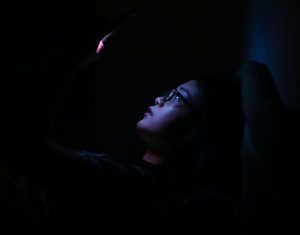The past two years have completely disrupted everyone’s sense of normalcy and have shifted the way we work, live, and play forever. It’s also wreaked havoc on our health and has caused millions of us to lose out on sleep due to heightened stress, heavier workloads, and more time spent on screens. The phenomenon of pandemic-induced sleep deprivation even has a name: coronasomnia.

But all is not lost. As we exit the pandemic, we all must understand the impact that life in lockdown has had on our health and take productive steps to undo the negative habits we may have formed.
Sleep and Stress
During the height of the pandemic, 8 in 10 Americans said that the Covid-19 pandemic caused them to suffer a significant amount of stress, and nearly half of American adults stated that they experienced behavioral changes like feeling tensions in their body, or “snapping” easily at their loved ones.
Unfortunately, that same report found that the causes of stress stack upon one another, as worries about healthcare, global warming, and mass shootings also caused significant stress in adult Americans.
Stress is a major contributing factor to missed sleep and the development of coronasomnia. That’s because sleep helps keep your hormonal levels in check so you can complete normal daily functions. But, when your sleep schedule is inconsistent, the healthy production of hormones like cortisol, estrogen, and insulin is disrupted. This leads to a vicious cycle of daytime fatigue, impaired focus, and increased stress.
Those who are suffering from coronasomnia are already familiar with the cyclical nature of high stress, a lack of sleep, and negative health consequences like unwanted weight gain and weakened immune systems. Folks who are suffering from coronasomnia may even be tempted to bury their head in the sand and spend excessive amounts of time looking at blue screens late into the night.
Screen Time and Sleep
Public opinion is starting to change on screen time and technology. Five years ago, it would be unthinkable that teens would readily give up their mobile devices and video games, but, a recent report from Arkos lab found that 53% of children would like to spend less time online. This makes sense, as too much screen time makes us feel dissociated from the real world, and virtual events are nowhere near as rewarding as spending time with friends in person.
Despite the desire to spend less time online, many people still scroll through social media while in bed. This is an issue, as excessive screentime at night is infamous for causing insomnia-like conditions, as the blue light emitted from phones and tablets mimics daylight. Additionally, current news is almost always stressful, and social media may cause a rush of dopamine that leaves folks feeling wired and unable to “switch off” even when they want to fall asleep.
Children and Coronasomnia
The pandemic has been hard for everyone, but it’s been particularly jarring for children. Kids have been removed from their normal social habits for some time now and may have found it difficult to adjust to a life spent in remote Zoom classrooms away from friends.
Additionally, parental mental health is integrally tied to children’s overall wellbeing and behaviors. This is particularly true if a parent has an untreated mental health issue like depression or anxiety that is keeping them awake at night. If a parent has struggled with pandemic-induced stress and coronasomnia, their children will likely model negative behaviors like staying up too late or using screens when they should be sleeping.
Controlling Stress for Better Sleep
If managing stress was easy, everyone would be living carefree lives by now. However, excessive, long-term stress is not easy to handle and can easily contribute to further health issues. Folks who are experiencing heightened stress for a prolonged period of time should always reach out to a medical professional or accredited therapist who can help them manage their symptoms.
However, most people can practice more stress-busting, sleep-friendly activities that can help them overcome coronasomnia. Common stress relief practices like meditation or journaling can easily fit into most people’s sleep schedule, and lifestyle changes like cutting out caffeine and alcohol may make it easier to drift off and experience deeper sleep.
It’s also worth noting that regular exercise can improve sleep quantity and quality. In the words of Charlene Gamaldo, M.D., medical director of Johns Hopkins Center for Sleep, there is “solid evidence that exercise does, in fact, help you fall asleep more quickly and improves sleep quality.” However, the kind of exercise and timing of your exercise is up to you but the idea remains the same: getting your body active throughout the day helps you drift off at night.
Sleep Hygiene Practices
There’s been a lot of buzz around the phrase “sleep hygiene” in the past few years. While some folks believe that you need a perfectly still, clean environment to sleep in, the reality for most of us is that small changes to sleep hygiene could make a big difference in the battle against coronasomnia.
Improving sleep hygiene starts in the bedroom. People who sleep in a dirty, noisy environment may find it harder to fall asleep — particularly if the bedroom also contains distractions like phones or televisions. Folks who want to improve their sleep hygiene should consider investing in black-out blinds, remove any screens from their sleeping area, and avoid the temptation to work while in bed.
Fortunately, managing screentime is a little easier now thanks to smart family technology. Smart family technology allows individuals and families to block access to certain websites throughout the day and compiles customized reports for greater insight into usage and poor screen-time habits. This can be particularly helpful for parents, who may be concerned about their children’s screentime and have noticed the early signs of coronasomnia.
Conclusion
Coronosomnia is an unfortunate but understandable by-product of the Covid-19 pandemic. We all had our lives turned upside-down, and may have struggled to adjust to the change of pace and increased stress. However, it is possible to undo the harmful effects of coronasomnia and get a better night’s sleep. Technology like smart family tracking allows users to better control their screentime, and mediation apps and videos are on hand to help relieve tension and find a sense of calm before bed.







Leave a Reply